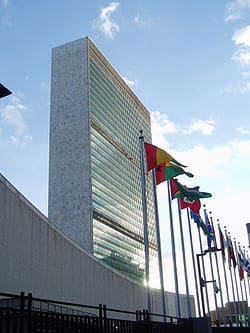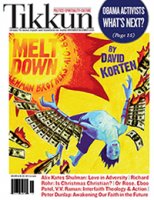In addition to the following items, David writes an occasional column for YES! Magazine and contributes articles to other magazines and online publications.
2022
For Love of Earth
David was invited to write an article for the Spring 2022 issue of 3rd Act Magazine, “…a bold, fresh, lifestyle magazine for older adults in the Puget Sound Region” of Washington State – and beyond – that “challenges the worn-our perceptions of aging and offer a dynamic new vision.”
David wrote: Engaging countless millions of people in deep conversations and local experiments leading to an ever more compelling, coherent, and actionable vision of our collective future is a defining challenge in 2022. We each have our role in meeting this challenge – especially those of use in our Third Act years.”
(February 2022)
2021
Ecological Civilization: From Emergency to Emergence
Drawing on the work and insights of many colleagues, this paper was written in an effort to connect the dots and engage a serious conversation about the causes of the existential crisis we face, while bringing a message of hope and possibility. It weaves together threads of ongoing conversations with global colleagues in which David is privileged to participate, and is directed to those who seek a future that works for all of Earth’s people and other beings. These conversations build from a simple, self-evident insight that carries profound implications for all that we do and seek to be.
(May 25, 2021)
2020
The UN’s Unsustainable Development Goals
In this article, written by invitation for the FEZANA (Federation of Zoroastrian Associations of North America) Journal (Vol. 34, No. 3 Fall/September 2020), David challenges the reader to think critically whether the wellbeing of people and of our world should supersede the growing of GDP and the financial assets of the rich.
(November 10, 2020)
Wellbeing versus GDP: The Challenge and Opportunity of Human Development in the 21st Century
A rearticulation of Human Development for the 21st century is much needed. I am honored by the invitation from the International Science Council and United Nations Development Programme to contribute to the discussion. I suggest that a defining focus of the discussion be on a question that the UN has long evaded: Is humanity’s defining economic goal to grow GDP or to secure the wellbeing of people and the living Earth?
(May 13, 2020)
My Priority for the Defining Year of Humanity’s Defining Decade
For me, 2019 was a year of learning and connecting as I renewed and deepened relationships developed over the past 50 years. Each experience advanced my thinking and engagement with key players in the unfolding effort to save humanity from itself. The global awakening to our failure and the related imperative for deep change creates an epic opportunity to transition to a new civilization dedicated to securing the wellbeing of people and planet. What I learned from Club of Rome discussions and my visits to China and South Africa bears special mention. Read more HERE…
(February 11, 2020)
2019
Management Education and Humanity’s Transition to a New Civilization
This version of a working paper originally published by the International Humanistic Management Association is adapted for discussion with faculty, students, and other stakeholders at events hosted by the University of Cape Town Graduate School of Business and the Human Sciences Research Council in Cape Town and Johannesburg, South Africa, in November 2019.
A New Economics for a New Civilization (for Club of Rome)
This version of the working paper has been adapted to contribute to discussions at the 2019 Club of Rome Annual Meeting in Cape Town, South Africa, in November 2019. It may be freely shared in whole or in part.
A 21st Century Economics for the People of a Living Earth (Version 4 – August 18, 2019)
This is the most recent update of a working paper by David Korten as a contribution to ongoing, collaborative discussions focused on framing a new economics.
Humanity is awakening to a grim reality. We have embraced an economic theory [neoliberalism] that ignores our fundamental nature. We are living beings born of and nurtured by the regenerative systems of a finite living Earth. Yet we have created an economic system that destroys Earth’s capacity to sustain life in order to grow the fortunes of billionaires.
A 21st Century Economics for the People of a Living Earth (Version 3 – Revised, July 2, 2019)
This is the latest revised version of the working paper written as a contribution to discussions framing a new economics for the 21st century.
Our most prestigious universities continue to teach economics principles now known to be driving humanity to self-extinction. An economics for the 21st century will guide us from an economy that empowers corporations in the service of money to an economy that empowers people in the service of life.
A 21st Century Economics for the People of a Living Earth (Version 2 – Revised, June 18, 2019)
This is the second and revised version of the working paper written as a contribution to discussions framing a new economics for the 21st century. The economic theory known as neoliberalism that became the global standard for national and global economic policymaking in the mid-20th century had a major role in guiding humanity into its current existential crisis. That same theory now poses a major barrier to navigating a global course change.
Economics for the People of a Living Earth (Version 1 -May 23, 2019)
This working paper was written as a contribution to discussions framing a new economics for the 21st century. In the spirit of indigenous wisdom, modern science, Laudato Si’, the Earth Charter, the Declaration Toward a Global Ethic of the Parliament of the World’s Religions, and the WEALL movement for a global Well-Being Economy, an economics for the 21st century will guide us from an economy that empowers corporations in the service of money to an economy that empowers people in the service of life.
2018
Toward an Ecological Civilization: A Path to Justice, Peace, and Care for Earth
This working paper was prepared as a background document for a series of presentations on the human step to an ecological civilization by John Cobb, Matthew Fox, David Korten, Frances Korten, and Jeremy Lent at the Parliament of the World’s Religions in Toronto, Nov 1-8, 2018. (The PDF of this paper is available to download.)
What Will It Take for Business To Improve Lives?
This paper posits that the private-purpose corporation, and the neoliberal ideology that affirms it, are major drivers of the social and environmental destruction we daily witness. If that is the case, then what might be essential features of business institutions that would better serve humanity? What might be the role of a Theory of Community? And what might that mean for business education? (This paper was prepared for and circulated in advance of the 78th Annual Meeting of the Academy of Management, Aug 10-14, 2018, in Chicago.)
Ecological Civilization and a Theory of Community
In this paper, David explores the epic choice facing China, specifically, and humanity in general. Will we choose the The Theory of the Firm and the neoliberal values and assumptions on which it is based, or the Theory of the Community which favors creating incentives such that all relationships, both monetized and non-monetized, seek to optimize the health, creativity, and well-being of individuals and communities. (This paper was included in the Conference Papers disseminated in advance of and presented by David at the 12th International Forum of Ecological Civilization, April 27-28, 2018, in Claremont, CA.)
From the Theory of the Firm to a Theory of Community
This paper proposes a Theory of the Community grounded in our most advanced understanding of the processes by which healthy living systems self-organize. This theory calls us to cultivate and utilize the highest potentials of our nature and to recognize that the institutions of business exist only to serve the community and must be subordinate to the institutions by which the community’s members govern themselves as a community. (This is a revised and expanded version of a paper by David Korten circulated to participants prior to the February 2, 2018 Necessary Conversation webinar, hosted by the International Humanistic Management Association.)
2017
Ecological Civilization and the New Enlightenment
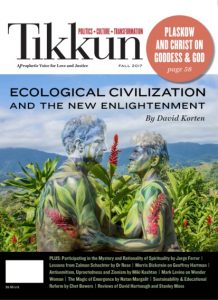 Originally published by Tikkun Magazine as the cover story for the Fall 2017 issue.
Originally published by Tikkun Magazine as the cover story for the Fall 2017 issue.
During the past century, we humans have become a truly global species with both the ability and the imperative to choose our common future by conscious collective choice. Growth in our numbers and the destructive power of our economic and military weapons of mass destruction creates the necessity; advances in communication technology that link us into seamless web of global communications and in biological and ecological sciences that deepen our understanding of what life is and how it organizes give us the means.
2016
A Living Earth Economy for an Ecological Civilization
Abstract: We humans are now a truly global species. Our common future depends on our successful transition to an Ecological Civilization that works in balanced and harmonious relationship with Earth’s living systems to provide every person with a means of living consistent with their need for health and happiness. (An earlier version of this paper was prepared for and presented to the 2016 Donghu Forum on Global Governance: Symposium on Green Development and Global Governance, Hauzhong University of Science and Technology, Wuhan, China.)
The New Economy: A Living Earth System Model
A report prepared for and published by the Next System Project, Aug 2016
Contrary to the illusion, money is not in itself wealth. No matter how big the financial-asset numbers recorded on computer hard drives stored in bank vaults, those numbers will not, and cannot, save human society from the unfolding social and environmental collapse driven by our obsessive quest for money.
Once we recognize that it is our life energy at play, we can begin to identify the opportunities available to us to redirect that energy from serving money, and the suicide economy, to serving life and the living Earth economy.
2015
Trans-Pacific Partnership (TPP)
In a series of articles/letters, David weighs in on TPP, Fast-Track, corporate control, and the implications for our environment, local business, American workers, and our democracy. These articles can be found HERE, including links to those published by YES! Magazine.
2013
Religion, Science, and Spirit: A Sacred Story for Our Time
Is it possible that the human future depends upon a new sacred story—a story that gives us a reason to care? Could it be a story already embraced by a majority, although it has neither institutional support nor a place in the public conversation?
The challenge before us is to create a new civilization based on a cosmology—a story of the origin, nature, and purpose of creation—that reflects the fullness of our current human knowledge; a story to guide us to mature relationships with one another and a living Earth.
This essay was originally published by YES! Magazine in January 2013. For the background, analysis, and inspiration for this essay, see David’s Personal Story Behind the Essay.
The Pursuit of Happiness: A Living Earth Economic Paradigm
How can we distinguish true new paradigm development from marginal adjustments in the old paradigm system? Written as a member of the New Development Paradigm Working Group appointed by the King of Bhutan as a contribution to a report requested by the United Nations.
2011
Report: Jobs: A Main Street Fix for Wall Street’s Failure
Co-authored with John Cavanagh, this New Economy Working Group report identifies the systemic causes of the jobs crisis and outlines a program of corrective action to shift power from Wall Street to Main Street, rebuild the middle class, and unleash America’s entrepreneurial potential.
Report: How to Liberate America from Wall Street Rule
This New Economy Working Group report, for which I am the primary author, makes the case that the institutional structure of the system by which money is created and allocated determines whether America is governed as a democracy or an oligarchy. It presents a series of proposals to create a money/banking/finance system that is transparent and democratically accountable.
Why I’m in Solidarity with #OccupyWallStreet
The Occupy Movement focuses attention on the systemic source of economic failure and creates a space for a much needed, but neglected national conversation about the need to restructure our economic institutions.
Agenda for a New Economy blog series
This collection of 34 blogs serializes and updates the key arguments presented in the 2nd edition of Agenda for a New Economy. It was produced as a partnership between YES! Magazine and CSRWire.
In Partnership with the Biosphere: Reframing the Debate on Limits
This is an invited contribution to a Club of Rome initiative to update and gain political traction for it’s effort to advance global understanding of and response to the conflict between Earth’s physical limits and perpetual economick expansion.
2010
Missing: A Vision of Economic Possibility
The 2010 election demonstrated that neither the Republican nor Democratic Parties has a credible vision for our economic future and that creates a moment of opportunity.
Bankers, Bookies, and Gamblers
Banks should be banks in the business of providing savings and investment services. Leave the gambling and book making to Vegas.
Debt vs. Localization: Climate Justice in the New Economy
Justice begins with restoring the producitive resources we have expropriate from the poor to their control for their benefit.
Jobs, Not Handouts
Giving public handouts to bankers is a fools errand. Use the money to put people to work meeting real needs.
Fix the Economy, Not Wall Street
Wall Street thrives and Main Street struggles because policy makers don’t recognize the difference between a phantom wealth economy and a real wealth economy.
2009
When Our Leaders Fail to Lead
The Afghanistan War is not the same as Vietnam War. We have even less prospect of success in Afghanistan.
How Does an Earth Community Economy Differ from an Empire Economy? 
The article spells out how the purpose and structure of an Earth Community economy differs from the purpose and structure of an Empire Economy. This article was published in the NGO daily newsletter “Outreach Issues” at the May 2009 meeting of the UN Commission on Sustainable Development.
Beyond the Bailout: Agenda for a New Economy
YES!, Winter 2009 issue on “Happiness.” Outlines an essential five-part policy framework to facilitate the work of responsible businesses, investors, civic organizations, and local governments engaged in growing a 21st century economy from the bottom up. (YES! magazine devoted a number of issues and articles to the New Economy; see their archive.)
2008
After the Meltdown: Economic Redesign for the 21st Century
We are Hard-Wired to Care
Smart Security and the End of War
2007
Only One Reason to Grant a Corporate Charter
This is David’s presentation to the Summit on the Future of the Corporation, in historic Faneuil Hall, Boston, November 13, 2007. There is a distinction between private benefit corporations chartered solely to serve purely private interests and public benefit corporations chartered to serve a larger public purpose. Most private benefit corporations are devoted to increasing aggregate consumption and inequality in a world facing the imperative to reduce both. The only reason for government to issue a corporate charter granting special privileges to a group of private investors is to serve a public purpose.
Living Wealth: Better than Money
YES! magazine, Fall 2007 issue on “Stand Up to Corporate Power. Taming corporate power is essential, but insufficient to heal our relationships with one another and Earth. We need a new prosperity story that gives priority to investing in the living wealth of healthy children, families, and communities and recognizes the essential role of government in maintaining the essential conditions of socially efficient markets, in particular the need for an equitable distribution of income and ownership.
Everybody Wants to Rule the World
An interview by Arnie Cooper in The Sun magazine, September 2007 on “Putting An End to Global Competition.” It is the story of how I came to write The Great Turning From Empire to Earth Community and my thoughts on the path ahead.
2006
The Great Turning: From Empire to Earth Community
YES! magazine, Summer 2006 issue on “5,000 Years of Empire.” Humanity faces a choice between two contrasting models for organizing human affairs. How we choose will determine our future course. It is a summary of key themes from my book of the same name and comes with a companion discussion guide to facilitate a group discussion.
2004
Social Health: Time to Make New Choices
Interview in Lilipoh: The Spirit in Life magazine #35, Spring 2004 dealing with what I believe is is required for human societies to move beyond the self-limiting violence of 5,000 years of Empire.
2002
Global Civil Society: The Path Ahead, with Nicanor Perlas and Vandana Shiva
This paper builds on the foundation of the IFG report Alternatives to Economic Globalization to place the discourse on globalization in a larger historical context, update the IFG analysis and recommendations to address the implications of the consolidation of right-wing extremism post-September 11, and suggest a strategic framework for global civil society in the work ahead. This paper launched the writing of The Great Turning: From Empire to Earth Community and framed its themes.
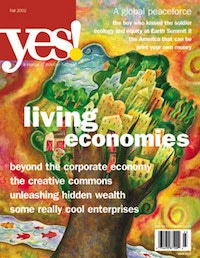 Economies for Life
Economies for Life
YES! A Journal of Positive Futures, Fall 2002. This is the lead article for a landmark YES! issue on “Living Economies.” Across America and throughout the world people are rising to the challenge of creating local living economies based on human-scale locally owned and accountable enterprises. This work is the key to democracy, equity, sustainability, and a better life for all.
Worse Off Today Than Before?
Ethix Bulletin, 25, September-October 2002 Interview. Ethix Bulletin is written for top level corporate executives by a professor of business ethics and a former top executive of the Boeing corporation. The interview explores and tests the thesis that the institution of the publicly traded corporation bears major responsibility for downward social and environmental trends.
The Movement Post-9/11
My reflections on the state of the global movement in March 2002 in the aftermath of the 9/11 terrorist attack as the focus turned from resistance against corporate globalization to capturing the positive in building positive alternatives from the bottom up. It was a period when the local living economies framing was beginning to gain traction.
2001
It’s About Democracy
I was a presenter at the Funders Network on Trade and Globalization (now known as EDGE Funders Alliance) briefing on corporate globalization on December 11 – 13, 2001 at the Tides Center in San Francisco, CA. The Environmental Grantmakers Association published “It’s About Democracy,” These are my reflections on the meeting and its implications for donor funding strategies as published in its quarterly newsletter, EGA Updates. Subsequently, I responded to follow-up questions from representatives of a private foundation.
The World According to George Soros
Tikkun, March/April 2001, pp. 71-74. Review of George Soros, Open Society: Reforming Global Capitalism, (Public Affairs, 2000). Summarizes Soros’ excellent critique of financial capitalism, but argues that his solutions fall far short of his analysis and would serve largely to keep the world safe for financial speculators at the public expense. Within a few days of the publication of this article, I was privileged to participate in a private all day meeting with Soros and members of the International Forum on Globalization for a wide ranging discussion. I gave him a copy of the review, which he had not yet seen. He was most gracious about my critical perspective. Whatever one may think of his role in the world of speculative finance, he has an inquiring mind and a gracious manner.
2000
The Corporation in 2050
Published in Marianne Williamson (ed.), Imagine: What America Could Be in the 21st Century (2000). Two contrasting scenarios of 2050 futures: one a world of sharply contrasting class division lives under America’s corporate world order and the other a world of democratic peace, justice for all, and a sustainable environmental balance.
For the Love of Life
Tikkun, January/February 2000. Explores the relationship between the new Creation story, ala Thomas Berry, translates into a new politics and a new economics.
1999
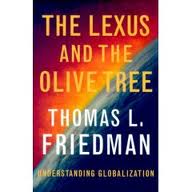 We Are the Capitalists. Resistance is Futile
We Are the Capitalists. Resistance is Futile
Tikkun, Vol. 14, No. 4, May-June 1999. Review of Thomas L. Friedman, The Lexus and the Olive Tree, (Farrar, Straus and Giroux, Inc., 1999). Friedman is perhaps the foremost spokesperson of the position that corporate globalization is both inevitable and universally beneficial. This blistering review uses Friedman’s own words to expose the extent to which his arguments are intellectually flawed and ethically challenged.
The Post-Corporate World
YES! A Journal of Positive Futures, Spring 1999. To create economies that serve life rather than money, we must base the design of our economic institutions on principles derived from the study of healthy living systems.
The Difference Between Money and Wealth
Business Ethics, January/February 1999. They call it investment. It is speculation. It is running out of control and destroying real wealth.
Korten Pre-1995 Contributions to Third World Development Theory and Practice
“Sustainable Development”
World Policy Journal, Winter 1991-92
Early in my effort to understand the dynamics and failings of the global development system, I was invited by the editors of the World Policy Journal to write a review of the current literature on sustainable development. The result was a comprehensive and carefully argued critique of contemporary economic theory and practice as it relates to issues of development and the environment. Reading this article twenty years later I am struck by how current the arguments remain and the extent to which most of my life since has been devoted to expanding and popularizing the critique and recommendations spelled out here so many years ago when. On the upside, the underlying framework is now well understood and accepted by a great many citizen activists. On the downside, it still remains to gain consequential traction among policy makers—the vast majority of whom cling to failed ideas that as this article cites were exposed by leading critics to be dangerously flawed more than 20 years ago.
From Relief to People’s Movements
This is a PDF version of Chapter 10 from my book Getting to the 21st Century published in 1990. It summarizes a framework for categorizing three generations of NGO strategy I spelled out in a defining article titled “Third Generation NGO Strategies: A Key to People-centered Development” published in a special Fall 1997 issue of the World Development journal. It then adds a fourth generation strategy to provide a framework for placing NGO strategies on a continuum of sophistication from first generation relief and welfare interventions that provide temporary relief from lack of access to adequate food, shelter, and medical care to social movement building strategies that seek to transform the upstream societal beliefs and institutional structures responsible for the down stream suffering the first generation NGOs interventions at best alleviate only temporarily.
This was my first serious look at the dynamics of social movements and the implications, from a management perspective, for civil society organizations devoted to societal transformation through the facilitation of social movements. This framework continues to be foundational to my thinking about large-scale change strategies.
Community Organization and Rural Development: A Learning Process Approach
This is a classic in the development and social learning literatures. Published in 1980 in the Public Administration Review, this article contrasts the top-down blueprint planning and management approach of most foreign funded development aid projects with the bottom-up social learning, organizational capacity building approach common to development initiatives that have demonstrable and sustained positive impact on the lives of the poor. Up until the publication of When Corporations Rule the World in 1995, it remained the publication for which I was best known internationally.
I subsequently worked under contract to the US Agency for International Development to advise on efforts to apply these concepts to USAID field office programming in Asia. In 1983 I prepared a report spelling out critical conflicts between AID’s blueprint project management procedures and the processes required to support a learning process in a grantee recipeint organization. See “Learning from USAID Field Experience: Institutional Development and the Dynamics of the Project Process.”
Situational Determinants of Leadership Structure
This article appeared in the September 1962 issue of The Journal of Conflict Resolution. It was subsequently reprinted in Cartwright and Zander, Group Dynamics, an anthology that at the time was used as the standard reader in college courses in group dynamics. This piece represents an early example of the interplay between book learning and learning from real world experience that came to characterize my career. It was inspired by my two month visit to Indonesia in the summer of 1961 during the authoritarian rule of President Sukarno. I was fascinated by the psychological dynamics behind the collective decision of a people to accept or reject authoritarian rule. I include this article here because of its relevance to our contemporary U.S. experience as elements of the far right mobilize mobs through lies and fear tactics to disrupt open democratic processes. It was my first publication in a professional journal.

